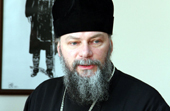Ombudsman, human rights NGO respond to accusations against Patriarch Ilia II
By Levan Abramishvili
Monday, November 4


!['[Patriarch Ilia II] is being demonized, negatively represented in society’s eyes' – Otar Kakhidze. Photo: Parliament of Georgia](edit3.jpg)

“I was stripped of my position as an archpriest by the Chair of the [ Holy ] Synod himself, which I believe is unjust. My revelation of the sin of sodomy in the Georgian Church was the reason behind it,” Tsaava told reporters after he left the meeting.
“The country has a Chair of the Synod tainted by the sins of pederasty and sodomy,” he added. Later he clarified that the term ‘pederasty’ is a liturgical term and means ‘debauching boys.’
Usually used to refer to historical practices of certain cultures, implying a sexual relationship between an adult and a pubescent or adolescent child, the term ‘pederasty’ is widely used in Georgia to describe queer men in a derogative manner.
While the allegations caught off guard the entire Church and tested loyalties within the institution and its parish, the Ombudsman, queer rights organizations and several politicians concentrated on the language used against the Patriarch.
The Public Defender (Ombudsman) of Georgia Nino Lomjaria responded to the events in a personal Facebook post. She denounced the use of sexuality as a ‘weapon’ and proclaimed her solidarity with the Patriarch. According to Lomjaria, the ongoing processes in the Patriarchate are a struggle for power and nothing more.
“One thing is clear to me. Everyone who uses the sexual orientation and the private life of others as a weapon for war hits rock-bottom,” said the Public Defender.
Equality Movement, a local NGO working on queer issues also responded to the accusations, saying that they go against the instrumentalization of LGBT identity and that the use of one's sexual orientation and gender identity for personal or political revenge is unacceptable.
In a statement, the NGO recalled many years of the anti-LGBT stance that the Church had, encouraging homophobia in its parish and the society.
“Today, when the patriarchate itself is the target of a homophobic attack that its Heads or priests may be members of the LGBT community, it is again harming the lives of lesbian, gay, bisexual and transgender people,” reads the statement.
“On the one hand the hostile stance of the Patriarchate towards the LGBT community and on the other the comments about the homosexuality of the Head of the Church may sound scandalous, but this should not deter us from remembering that we are living in a secular state where homosexuality is not a crime and especially not a sin. Therefore any discussion that is based on the rhetoric of the Church law unknown to the democratic state against any individual must be dissociated from,” writes the Equality Movement.
Otar Kakhidze, an opposition party European Parliament MP thinks that Petre’s statements seem vengeful and would have been more credible if he made the accusations before he was stripped of his titles.
“The calculation is also very bad. Because there are homophobic attitudes in the society, manipulating with that and discrediting the Patriarch, in my opinion, is further undignified behavior, because practically he is being demonized, negatively represented in the society’s eyes” said Kakhidze.
So far Petre Tsaava has failed to present any evidence to back his claims against the Church and the Patriarch. It is yet unclear if his only intention was to discredit his opponents within the Church, or he was telling the truth. Regardless of that, the accusations, especially hinting at possible pedophilia in the Orthodox Church, should serve as an incentive for the authorities to take interest in the largely uncontrolled work of the arguably most powerful institution in the country.
